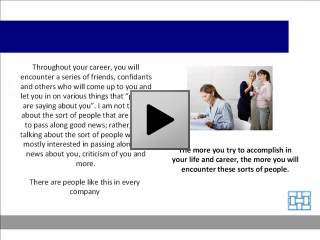total jobs
On SellingCrossing
221,126
new jobs this week
On SellingCrossing
16,587
total jobs
on EmploymentCrossing network available to our members
1,473,056
job type count
On SellingCrossing
- Sales Associate (38,067)
- Business Sales (29,980)
- Sales Coordinator (26,082)
- Financial Sales (23,848)
- Sales Management (20,911)
- Sales Marketing (17,961)
- Sales Manager (15,015)
Daily Job Search Video by Employment Potentials
By Harrison Barnes
Employment Research Institute's CEO, A. Harrison Barnes as he analyzed how our careers and lives can be influenced by criticism and our responses to it.
You will encounter a series of people who claim to inform you about what others think of you. Most often, this is more about passing on something negative rather than something good about you. Ironically, you will encounter such people more often as you ascend the ladder of success. Citing an example from his own life, Harrison explains the difference between unwarranted criticism and positive criticism. As a sixteen-year-old, his step-mom once severely criticized him for bringing over friends, including girls, home to watch television on a Friday night. She was resentful about him attending an expensive private school and used the incident to suggest that he should be sent back to his previous, lesser expensive school. Often, unwarranted criticism is a result of people’s own fears and insecurities than anything concrete. It is more a reflection of their own jealousies and feelings of being threatened. Positive criticism, on the other hand, results from the person having your best interests at heart.
Unfortunately, you will mostly encounter negative criticism, whether in your family or work life. The person indulging in this rarely has your best interests at heart and instead, is trying to bring you down. Though this sounds terrible, it is quite normal for some people. How you deal with this criticism is what will finally shape your desires and goals. One of the best ways to manage it is by not letting it affect you. This way you don’t let others’ negative opinions affect you.
Criticism, Your Career, and Your Life
By Harrison Barnes
Employment Research Institute's CEO, A. Harrison Barnes as he analyzed how our careers and lives can be influenced by criticism and our responses to it.
You will encounter a series of people who claim to inform you about what others think of you. Most often, this is more about passing on something negative rather than something good about you. Ironically, you will encounter such people more often as you ascend the ladder of success. Citing an example from his own life, Harrison explains the difference between unwarranted criticism and positive criticism. As a sixteen-year-old, his step-mom once severely criticized him for bringing over friends, including girls, home to watch television on a Friday night. She was resentful about him attending an expensive private school and used the incident to suggest that he should be sent back to his previous, lesser expensive school. Often, unwarranted criticism is a result of people’s own fears and insecurities than anything concrete. It is more a reflection of their own jealousies and feelings of being threatened. Positive criticism, on the other hand, results from the person having your best interests at heart.
Unfortunately, you will mostly encounter negative criticism, whether in your family or work life. The person indulging in this rarely has your best interests at heart and instead, is trying to bring you down. Though this sounds terrible, it is quite normal for some people. How you deal with this criticism is what will finally shape your desires and goals. One of the best ways to manage it is by not letting it affect you. This way you don’t let others’ negative opinions affect you.
Testimonial of the Week
- Jose M Santa Cruz, CA
Sign Up now
Only SellingCrossing consolidates every job it can find in the domain and puts all of the job listings it locates in one place.
- We have more jobs than any other job board.
- We list jobs you will not find elsewhere that are hidden in small regional publications and employer websites
- We collect jobs from more than 4,429,376 websites and post them on our site.
- We are private, and therefore far fewer people are applying for the jobs on our site than are applying for those on public job boards.

